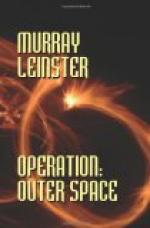Cochrane waited. He had to hold carefully in his mind that this visible abyss, this enormity of purest dark, was not an opening into nothingness but was simply Earth at night as seen from space.
Then he saw a faint, faint arch of color forming at its edge. It spread swiftly. Immediately, it seemed, there was a pinkish glowing line among the multitudinous stars. It was red. It was very, very bright. It became a complete half-circle. It was the light of the sun refracted around the edge of the world.
Within minutes—it seemed in seconds—the line of light was a glory among the stars. And then, very swiftly, the blazing orb which was the sun appeared from behind Earth. It was intolerably bright, but it did not brighten the firmament. It swam among all the myriads of myriads of suns, burning luridly and in a terrible silence, with visibly writhing prominences rising from the edge of its disk. Cochrane squinted at it with light-dazzled eyes.
Then Babs cried softly:
“Beautiful! Oh, beautiful!”
And Cochrane shielded his eyes and saw the world new-born before him. The arc of light became an arch and then a crescent, and swelled even as he looked. Dawn flowed below the space platform, and it seemed that seas and continents and clouds and beauty poured over the disk of darkness before him.
He stood here, staring, until the steel shutters slowly closed. Babs said in regret:
“You have to keep your hand on the button to keep the shutters open. Else the window might get pitted with dust.”
Cochrane said cynically:
“And how much good will it have done me to see that, Babs? How can that be faked in a studio—and how much would a television screen show of it?”
He turned away. Then he added sourly:
“You stay and look if you like, Babs. I’ve already had my vanity smashed to little bits. If I look at that again I’ll want to weep in pure frustration because I can’t do anything even faintly as well worth watching. I prefer to cut down my notions of the cosmos to a tolerable size. But you go ahead and look!”
He went back to Holden. Holden was painfully dragging himself back into the rocket-ship. Cochrane went with him. They returned, weightless, to the admirably designed contour-chairs in which they had traveled to this place, and in which they would travel farther. Cochrane settled down to stare numbly at the wall above him. He had been humiliated enough by the actions of one of the heads of an advertising agency. He found himself resenting, even as he experienced, the humbling which had been imposed upon him by the cosmos itself.
Presently the other passengers returned, and the moonship was maneuvered out of the lock and to emptiness again, and again presently rockets roared and there was further feeling of intolerable weight. But it was not as bad as the take-off from Earth.




